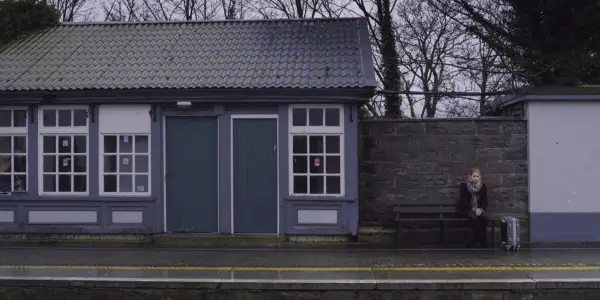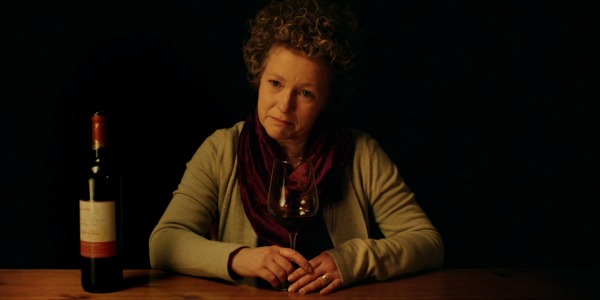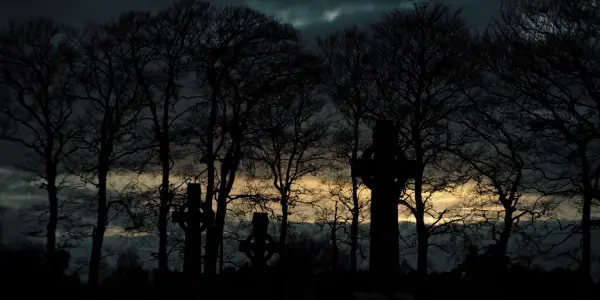JANUARY HYMN: An Odic Tour Of Grief

Amyana Bartley is a screenwriter and producer. Her company, Queen…
“Sure, I’ll see you again before either of us knows it”.
It’s a sentiment resonating with most of us after the passing of a loved one. This line opens the beautiful, bleak, January Hymn, written and directed by Katherine Canty.
A Picture Is Worth A Thousand Words
Having studied the art of screenwriting for many years, I’m familiar with the saying “Show, Don’t Tell”. Film is supposed to be a myriad of pictures that tell a story. As a screenwriter, the challenge is to use as little narration as possible in a script. It’s in the images and actions of the characters that the stories are to be told. In recent years, there has been a general failure in this process in most mainstream films.

Enter the allegorical January Hymn. Set in a small Irish town during a gray January, Clara (Niamh Algar) returns home on the one year anniversary of her father’s death. Right from the start she is wrapped in the feelings of isolation, numbness and obligation to the ceremonial traditions surrounding death.
Sitting alone at the empty train station, there is very little noise and the viewer is drawn into the painful silence. A thoughtful montage of imagery and Clara’s memories ensue, only to be startled into reality by the arriving train. Much of the film is shot this way, inviting the audience close in to Clara’s world. There is nothing here that is superfluous or unnecessary.
Color Me Warm
The cinematography captured by Kate McCullough sends us through the whirlwind of the bluey-grays of sadness. Algar portrays the anesthetized melancholy of past grief perfectly. She is polite and tolerating, even though clearly disinterested in the well-meaning condolences from townsfolk. The ache of her hollow need is ever present and unwavering, even with her family members.

Through accomplished lighting and coloring, we get a short but much needed reprieve from the blues, in a scene with Clara’s loving Aunt (Ally Ni Chiarain). Clara’s Aunt makes small talk and shares a comforting memory of Clara’s father. Though we feel the love between Clara and her Aunt, there is still a haunting feeling of unrest surrounding them both. Behind the warmth of the meager candle-like lighting lies the all-encompassing black of the unknown.
The use of sound here and throughout January Hymn gives eerie voice to the spiritual world ever present and all around. It begs us to take a moment and listen close. For, within the silence lies the realm of those passed, and they are eager to share with us.
The Farewell
The film is a journey for Clara on her way to resolution and understanding of death. Through brilliant imagery, we see how close yet how far she is. No matter how much she struggles to make sense of this, there really is no resolution. The struggle for the living to come to grips with death is dubious at best. Though we all will have to experience it, while alive we will never be able to make sense of it.

The film leaves its protagonist and its audience, appropriately, in a never-ending circle of questions. Death is never comfortable and you will find no comfort here, save the obscure hope of finding our lost loved ones in an afterlife.
In Conclusion
Overall, January Hymn is an impressively accurate depiction of grief. Though we may not want to, the film forces us into death’s ceaseless depths, with no apologies. It is extremely well crafted and clearly well thought out.
We feel every moment of Clara’s journey and understand it as little as she does. We feel her desire to escape and have things the way she knew them before. Like real life, though, death holds a permanence that never releases its grip, no matter how much we struggle. Canty and her crew are masterful storytellers through imagery, leaving us with many unresolved questions; but answers don’t belong here.
There is a glimmer of hope with the use of spiritual whispers in January Hymn, incessantly clamoring for the characters’ attention.They plead with us to listen, believe and reconnect, reassuring us that one day, we will see them again.
What’s your experience?
Does content like this matter to you?
Become a Member and support film journalism. Unlock access to all of Film Inquiry`s great articles. Join a community of like-minded readers who are passionate about cinema - get access to our private members Network, give back to independent filmmakers, and more.
Amyana Bartley is a screenwriter and producer. Her company, Queen B. Productions, supports filmmakers of all walks, interested in creating thought provoking, moving projects. As her company grows, she will create "real jobs" for any talented artist, in front of and behind the screen, who is passionate about making a difference using the art of film.












